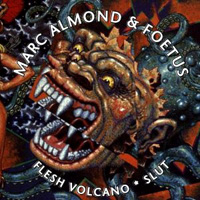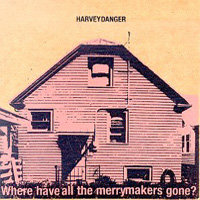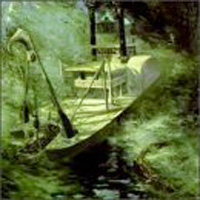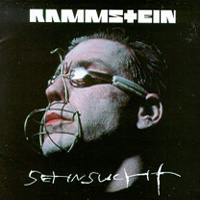 Rammstein
Rammstein
Sehnsecht (Slash)
An interview with guitarist Paul Lenders
by Nik Rainey
For most of us, our first exposure to Rammstein was in appropriate surroundings – in the midst of the ambiguous carnage of David Lynch’s Lost Highway, this Kraut electro-metal band’s guttural thump and dank, wrenching riffs couldn’t help but stand out. (Listen to the soundtrack once and I betcha you’ll be mock-solemnly intoning “RAMM-schtein” like a Teutonic Clarence “Frogman” Henry for weeks afterwards.) Even so, they remained overshadowed in the press by the bigger (if not across-the-board better) names that surrounded them, my personal opinion at the time being that they’d likely have the staying power of Powermad, the speed-metal band that contributed a memorable cameo in Lynch’s Wild At Heart and were subsequently never heard from again. And though the jury remains out on their eventual Stateside impact, Rammstein does seem to be, like your average bowel-liquefying virus, leaving an impression.
Rammstein’s second album and U.S. debut, Sehnsucht (Motor/ Slash), comes swaddled in hyperbole: No band that literally sets itself ablaze as a regular part of its live show (Gene Simmons, you’re a wuss) can avoid that kind of attention, really. But the music is just as incendiary as they are, if a little less likely to leave permanent scars: any questions about stretching the potency they showed in a mere two songs on a movie soundtrack to album-length are quickly quashed once their Wagnerian grandeur takes hold about ten seconds into the first song. With a tiny bit of trepidation, I decided to discuss matters Rammsteinian with guitarist Paul Lenders. His condition: that he have an interpreter on hand to avoid embarrassing himself with his imperfect English. My condition: that we do it over the phone to avoid the possibility of accidental interviewer combustion (wisdom I wished I’d had when I interviewed Michael Jackson on the set of that Pepsi ad). Achtung, jungenden:
How are things going for you in your home country?
Everything’s going really really well, we’re selling a lot of records, playing for lots of people, things really couldn’t be better. We’ve been #1 on the charts and held open-air concerts for 20,000 people here.
Is the story I’d heard that David Lynch had played Rammstein music all through the Lost Highway shoot true?
We were told that was the case. We had sent him a copy of the album – we originally wanted to make a video with him, but were informed that he’d be unable to, that he had no time. And in 1996, we received a letter from his wife, Mary Sweeney, who had told us that they’d be very pleased to use two songs for their film. So we telephoned her and she asked if it were possible to get hold of the album in the States, which at the time it was not. She told us that the crew had been listening to Rammstein every day on the set. They asked if we could send more copies of the record, we asked how many crew members there were, they said 120, so we sent seventy more copies of the album to them.
How have things changed for you since the release of that film because of your presence on that soundtrack? It meant that we got to travel to Paris for the first time, because it was the French (CIBY 2000) who released the film first, and they were the first to really take to Rammstein. And when we were over in the States with KMFDM, we were in a car with two girls in Austin, Texas, and they asked us who they were, we told them we were called Rammstein, and that we were playing at Liberty Lunch that night. We looked around their CD collection, and found that they had the Lost Highway soundtrack in there, they went to the concert as well, and that was a nice welcome to the States for us.
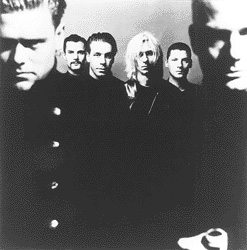 The music is very dark and powerful – what inspires that, musically and socially?
The music is very dark and powerful – what inspires that, musically and socially?
With regards to music, all the members of the band had been playing in other bands and playing very different kinds of music. We were all at different angles musically: some were playing in folk-punk bands, others in punk crossover bands, and we tried from the very beginning to find something that all of us had in common. The differences were so extreme that it took us a while to find exactly what sort of music we could all make together. There was no way we could have gotten together to play a sort of “Californian” music. With regards to the German mentality, it’s focused on that as well. It’s geographical. But with regards to social aspects, I don’t really know. The band had formed at a very important time: our singer (Till Lindemann) had been writing what we considered very dark love songs, which captured something of what we were feeling in 1994. The songs were about the less sunny side of love. At the time, we were all in the same sort of situation – we were all getting over break-ups of long-term relationships, and this influenced our lyrics a lot. We call our songs “love songs” even though people don’t quite understand this. They see it differently in the U.S. because the people there don’t have direct access to the lyrics, being in another language. The dark side of sexual relationships as well and the dark side of relationships in general.
Who do you consider your musical peers?
We don’t like to compare bands and the music they make because people have different tastes, but there are a few people in the band who are really into pop music, some who are into techno, “big-beat,” and others who are into harder music. The tastes that we have in common from Germany would probably be Kraftwerk, from England, the Prodigy, from the States, the Chili Peppers, Metallica, and Beck… we all grew up listening to different kinds of music.
Okay, now to the meat of the matter… How do you guys manage to set fire to yourselves on stage without injuring yourselves?
Uh… with lots of injuries, basically (laughs). Injury brings success (laughs harder). It all started, really, with Till, who up until that point wasn’t a singer at all, but had been persuaded to sing – he was a friend of Richard (Kruspe)’s who had come from the same town in northeast Germany and had been a drummer in a punk band previously. It all stems from the fact that Till was very unsure of himself onstage at the beginning, and he had the idea of using simple pyrotechnics to entertain the audience and to keep him busy as well because he didn’t quite know what to do with his hands. Then he realized that people liked it, so he overcame his insecurity that way. It got a bit out of control, really – people started to latch onto the idea and other people in the band wanted to get involved, and we had a few concerts in which the clubs were relatively empty, which gave us the opportunity to use fire in the audience as well. We were in a club which would have held about four hundred people and there were only about twenty or thirty in the audience, so we poured petrol into the audience and threw pyrotechnics from the stage, and it just sort of, um… took off from there (laughs). Hoo-hah, hoo-hah! And they’re still developing today. Till also got his pyrotechnic license, which allows him to buy materials and use them onstage, and we brought in experts in order to improve the effects, make them bigger and more interesting, so we can use the effects in front of sixty or seventy thousand people and have indoor effects as well. We’re trying to make it more interesting all the time.
That’d help, I guess… One last question – does Rammstein have a message for America?
(In English) Oh, God… Um, Clinton needs sex, too (laughs).

